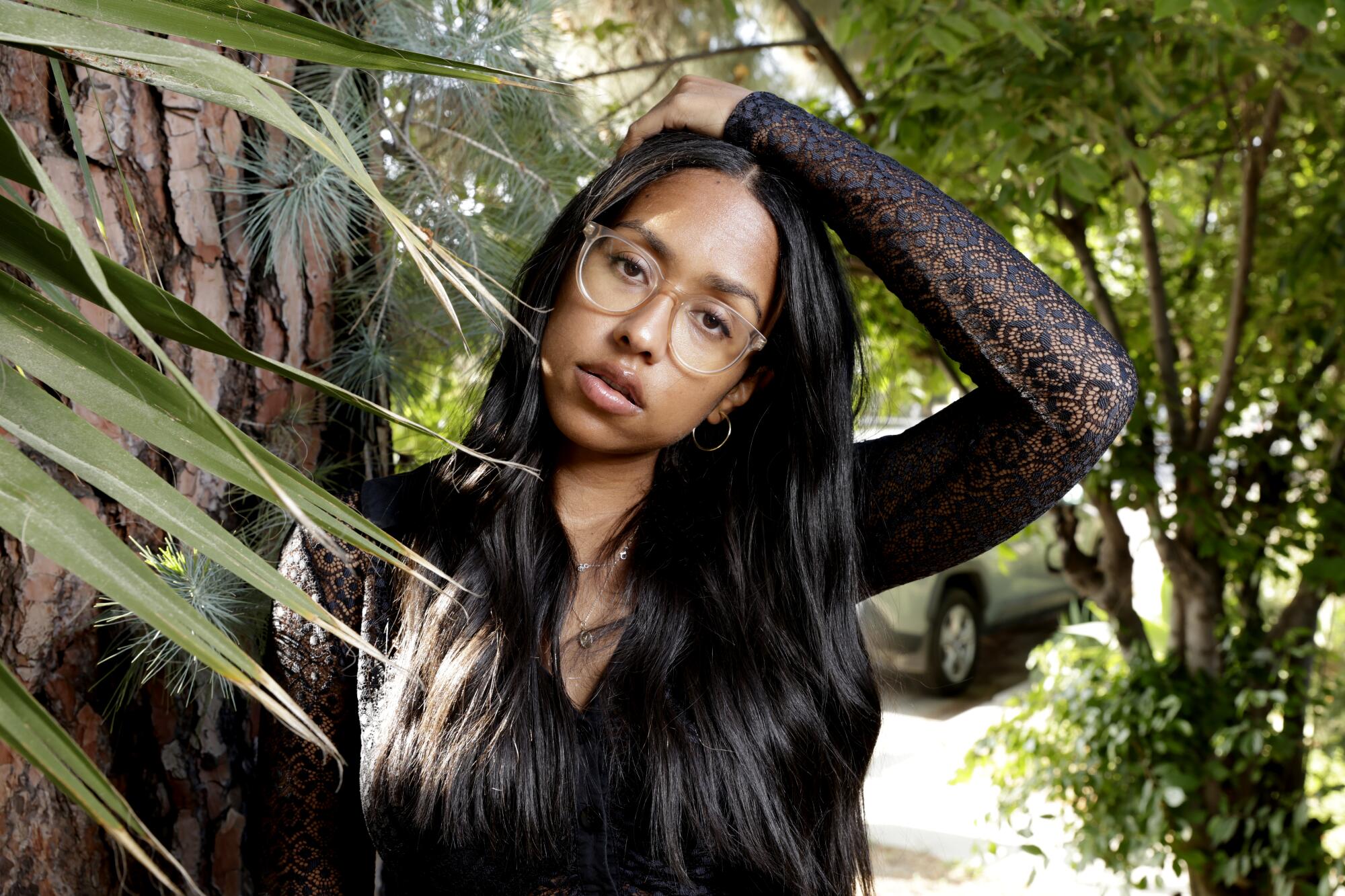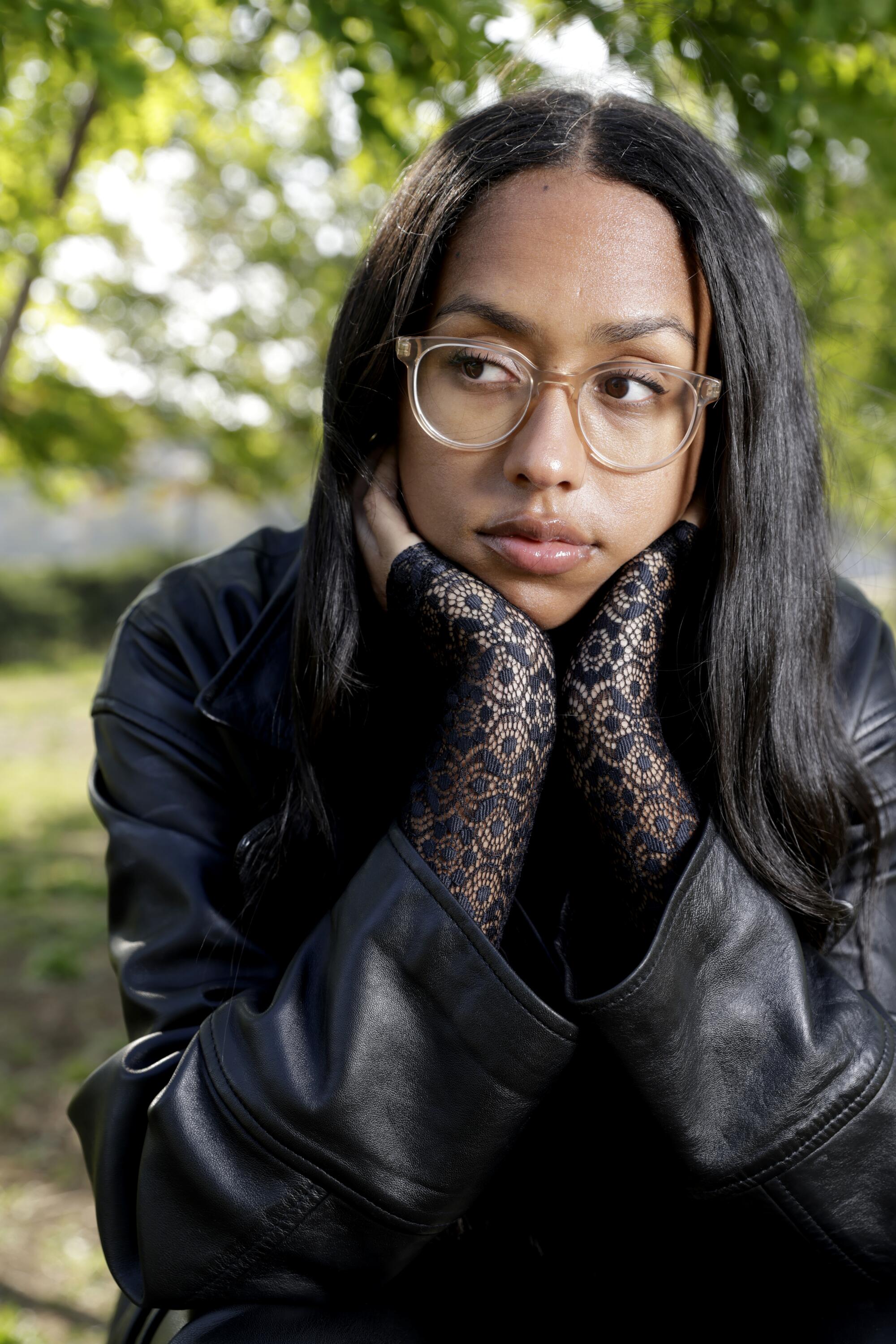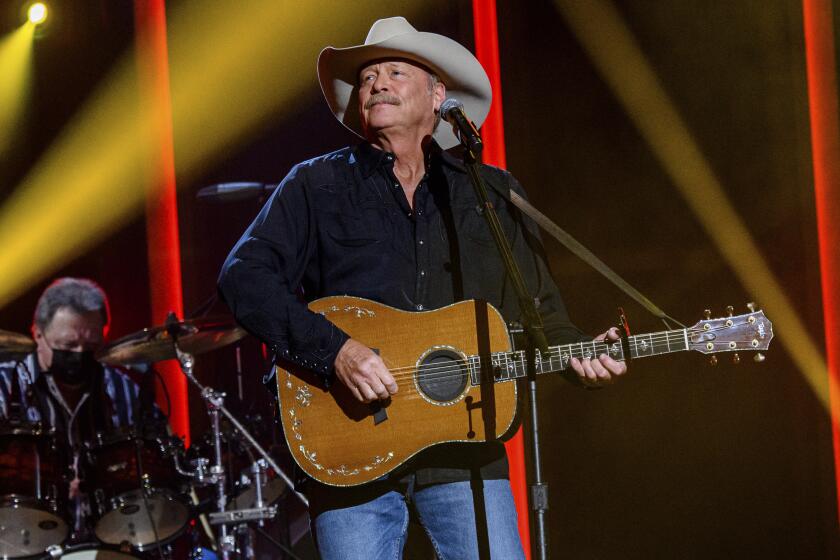
- Share via
Jensen McRae is still chewing over something her therapist told her during their first session together.
“I was talking about how sensitive I am and how I was feeling all these feelings,” the 27-year-old singer and songwriter recalls, “and she was like, ‘You have yet to describe a feeling to me — everything you’ve described is a thought.’” McRae’s eyes widen behind her stylish glasses. “That destroyed me. She said, ‘Feelings are in your body. Thoughts are in your head.’
“This was like six years ago, and I think about it constantly.”
A proudly bookish Los Angeles native whose academic ambitions took her to the competitive Harvard-Westlake School, McRae wrote her first song at around age 8; by the time she was a teenager, music had become her way to cope with the cruelty of the world. Yet when she looks back at the stuff she wrote when she was younger, what strikes her isn’t that it was too raw — it’s that it wasn’t raw enough.
“I think I was trying to intellectualize my feelings to get away from being vulnerable,” she says. “Now I know there’s room for both — there’s a way to be intellectually rigorous about my sensitivity.”
Indeed, there is, as McRae demonstrates on her knockout sophomore album, “I Don’t Know How but They Found Me!” Released in April by the respected indie label Dead Oceans (whose other acts include Mitski and Phoebe Bridgers), the LP documents the dissolution of two romantic relationships in gleaming acoustic pop songs that use gut-punch emotional detail to ponder complicated ideas of gender, privilege and abuse.

In “Massachusetts,” a snippet of which blew up when she posted it on TikTok in 2023, she captures the private universe she shared with an ex, while “Let Me Be Wrong” thrums with an overachiever’s desperation: “Something twisted in my chest says I’m good but not the best,” she sings, the rhyme so neat that you can almost see her awaiting the listener’s approving nod.
“I Can Change Him” is an unsparing account of the narrator’s savior complex that McRae was tempted to leave off the album until her team convinced her otherwise.
“I think of myself as an evolved and self-actualized woman,” she says with a laugh. “So the admission that I thought it would be my love that transforms this person — I mean, it’s super embarrassing.”
Then there’s “Savannah,” which lays out the lasting damage left behind after a breakup, and the chilling “Daffodils,” in which McRae sings about a guy who “steals base while I sleep.”
McRae’s songs don’t flinch from trauma, but they can also be very funny. “I’d like to blame the drugs,” she sings, longing for toxic old comforts in a song called “I Don’t Do Drugs.” And here’s how she brings the guy in “I Can Change Him” to life in just a few lines:
Same old eight-dollar cologne
Same old he can’t be alone
Same old cigarettes he rolls
Same old Cozmo’s “Plastic Soul”
Asked whether she’d rather make someone laugh or cry, McRae needs no time to think. “I’m always proud when I make someone cry,” she says as she sits on a park bench in Silver Lake on a recent afternoon. “But more important to me than being the sad girl is that I’m funny — that’s way more important to my identity.” She smiles.
“I’ve definitely made dark jokes where people are like, ‘That’s horrible that you think you can joke about that,’ ” she says. “I’m like, ‘It’s my thing — the sad thing happened to me.’ ”
Wilson, who died Wednesday at 82, was one of music’s true visionaries, if that’s the right word for a guy who dealt in the endless possibility of sound.
McRae’s music has attracted some famous fans. In 2024, she opened for Noah Kahan on tour, and she recently jammed with Justin Bieber at his place after the former teen idol reached out on Instagram with kind words about “Massachusetts.” Last month, McRae — a graduate of USC’s Thornton School of Music — played a pair of packed hometown shows at the El Rey, where she introduced “Savannah” by telling the crowd, “You are not defined by the worst thing that ever happened to you.”
“Jensen is extremely … if I say the word ‘gifted,’ you’ll be like, ‘OK’ — but she truly is a gifted individual,” says Patrice Rushen, the veteran jazz and R&B musician who mentored McRae as chair of the Thornton School’s popular music program. (Among the classics McRae learned to perform during her studies was Rushen’s 1982 “Forget Me Nots.”) Rushen praises the depth and precision of McRae’s songwriting and “her ability to see beyond what’s right in front of her and to find just the right word or texture in her storytelling.”
“I adored her as a student,” Rushen adds.
McRae was born in Santa Monica and grew up in Woodland Hills in a tight-knit family; her dad is Black and her mom is Jewish, and she has two brothers — the older of whom is her business manager, the younger of whom plays keyboard in her road band.
The singer describes herself as both a goody two-shoes and a teacher’s pet, which she affectionately blames on her father, a lawyer who went to UCLA and Harvard Law School. “He was born in 1965 — his birth certificate says ‘Negro’ on it, which is crazy,” she says. “His whole life, it was: ‘You have to be twice as good to get half as far.’ And even though I was born in the ’90s, that was still kind of instilled in us.
“Especially being at Harvard-Westlake,” she adds. “I was one of the few Black kids, and I didn’t want to be underestimated. Now, I find being underestimated kind of funny because I have so much confidence in my own ability that when someone thinks I’m not gifted in whatever way, I’m like, ‘Oh, you’ll find out you’re wrong soon enough.’ ”

Having absorbed the songwriting fundamentals of James Taylor, Sara Bareilles and Taylor Swift, McRae entered USC in 2015 and played her first gig — “the first one that wasn’t a school talent show,” she clarifies — at L.A.’s Hotel Cafe after her freshman year.
“I don’t know if my mom knows this, but I told her not to come,” she recalls with a laugh. “I was like, ‘I’m 18 — I’m grown up now — and I’m gonna be hanging with all these cool people.’ ” In fact, her audience that night consisted of only the bartender and the other acts on the bill.
Her creative breakthrough came when she wrote her song “White Boy” when she was 20. It’s about feeling invisible, and McRae knew she’d achieved something because “when I finished it, I was like, ‘I can never play this in front of anyone.’ ” A few years later, during the COVID-19 pandemic, she fired off a jokey tweet imagining that Bridgers would soon write a song about “hooking up in the car while waiting in line to get vaccinated at dodger stadium”; the post went viral, racking up shares from thousands of people, including Bridgers.
“I had to put my phone in a drawer because it was buzzing so much,” says McRae, who ended up writing the song herself and calling it “Immune.”
For “I Don’t Know How but They Found Me!” — the title borrows a line of dialogue from “Back to the Future” — McRae sought a lusher sound than she got on her folky 2022 debut; she recorded the album in North Carolina with the producer Brad Cook, who’s also worked with Bon Iver and Waxahatchee and who helped fill out the songs with appealing traces of turn-of-the-millennium pop by Avril Lavigne and Ashlee Simpson.
As a singer, McRae can expertly control the sob in her voice, as in “Tuesday,” a stark piano ballad about a betrayal made all the more painful by how little it meant to the traitor. At the El Rey, McRae doubled down on that theme in a florid yet intimate rendition of “I Can’t Make You Love Me,” the Mike Reid/Allen Shamblin tune that Bonnie Raitt turned into one of pop’s greatest anthems of dejection.
What did McRae learn about songwriting at USC? She mentions a technique called “toggling,” which one professor illustrated using John Mayer’s “Why Georgia.”
“The first line is, ‘I’m driving up ’85 in the kind of morning that lasts all afternoon,’” McRae says. “That’s a description of the outside world. Then the next line is, ‘I’m just stuck inside the gloom,’ toggling back to the internal emotion. That’s something I pay attention to now. If I’m writing a verse, I’ll do scene-setting, scene-setting, scene-setting, then how do I feel about it?”

McRae is particularly good at dropping the listener into a scenario, as in “Savannah,” which starts: “There is an intersection in your college town with your name on it.” To get to that kind of intriguing specificity, she’ll sometimes write six or eight lines of a verse, to discard the first few — “Those are often just filler words,” she says — and “rearrange the rest so that whatever I had at the end goes at the top. Now I have to beat that.”
For all her craft, McRae knows that songwriting is just one of the skills required of any aspiring pop star. She loves performing on the road, though touring has become “physically punishing,” as she puts it, since she was diagnosed a few years ago with a thyroid condition and chronic hives, both of which have led to a severely restricted diet. She recently posted a TikTok in which she detailed her regimen of medications — one attempt, she says, to bring some visibility to the topic of chronic illness. (That said, McRae admits to being unsettled by the DM she received the other day from a fan who recognized her at her allergist’s office: “They’re like, ‘Hey, I saw you — I was going in to get my shots too.’ ”)
McRae views social media more broadly as “a factory that I clock into and clock out of.” She’s well aware that it’s what enabled her to start building an audience. And she’s hardly anti-phone.
“I love being on my phone,” she says. “I literally was born in the right generation. But when it comes to constantly looking at images of myself, that’s my business card or my portfolio — it’s not actually me, the human being.”
In January, she deleted TikTok during the brief outage related to President Trump’s ban of the app. “Then, of course, it came back right away, but I couldn’t re-download it. So for a month I didn’t have TikTok. As it turns out, I was fine.”
Arguably better?
“Probably, yeah. I’m back on it now, obviously, because I have to do promo. At first I thought it was the loudest, most overstimulating thing in the world — I couldn’t believe I used it. Then after a week, I was like, oh yeah, no, I’m reacclimated.”
More to Read
The biggest entertainment stories
Get our big stories about Hollywood, film, television, music, arts, culture and more right in your inbox as soon as they publish.
You may occasionally receive promotional content from the Los Angeles Times.












